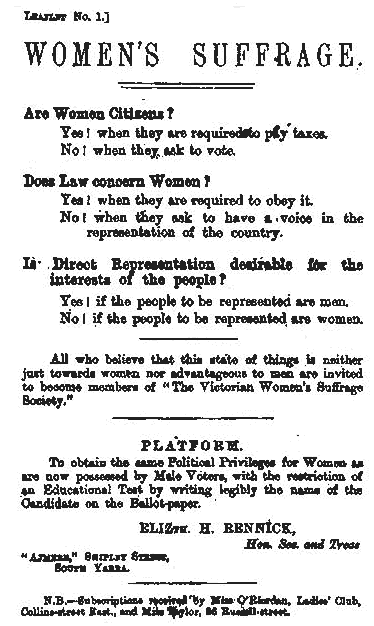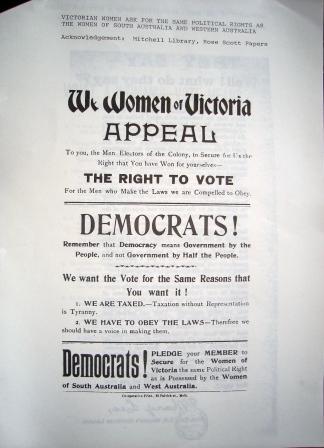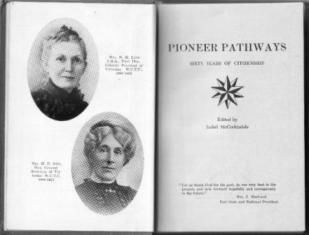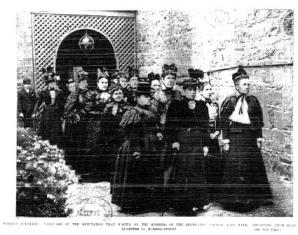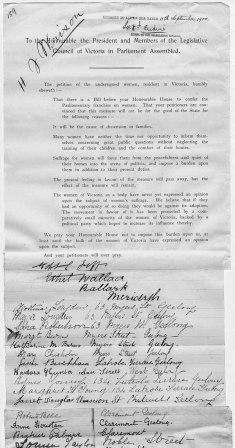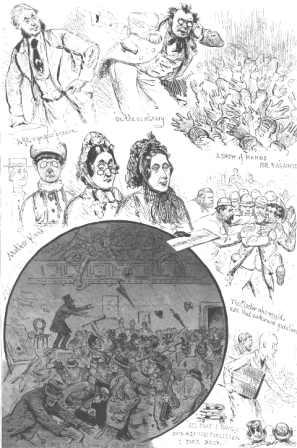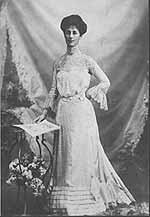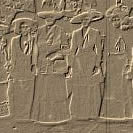 |
WOMEN WORKING TOGETHER |
THIS SITE CONTAINS
1 to 5 - Winning the vote
Chapter 1: The Vote or Bust 1788-1908
Chapter 2: Who Were the Suffragists?Chapter 3: 'United and Representative Agitation'
Chapter 4: Anti-Suffragists 1900-1910Chapter 5: Onwards to Success 1884-1908
6 to 10 - Social Justice and peace
Chapter 6: Moving into the Public World
Chapter 7: 1914-18 War - Pro Peace, Pro and Anti War
Chapter 8: Women's Work in WW1
Chapter 9: 1919-1935 - Surviving
Chapter 10: 1935-1945 Still Surviving
11 to 15 - Finding our voice as women
Chapter 11: 1945 and after - In Our Own Right
Chapter 12: 1970's Protesting - Working Together Again
Chapter 13: Finding Our Voice - Women's Liberation
Chapter 14: Working Collectively
Chapter 15: The 1970's & 80's Broader Women's Movement
16 to 20 - Our legacy our strength our struggle
Chapter 16: In Our Own Hands - Our Bodies
Chapter 17: Whose Right to Choose?- Our Selves
Chapter 18: Environment Matters
Chapter 19: 1990's When the Women's Movement is Quiet
Chapter 20: What a Legacy We Inherit!
Appendix 1: Papers and Interviews
Appendix 2: Songs from the Women's Movement
WOMEN FROM THE
WOMEN'S MOVEMENT
MENTIONED IN THIS WORK.
Abigail Adams
Ada Brougham
Adela Pankhurst
Adrian Howe
Agnes Murphy
Aileen Goldstein
Ailsa O'Connor
Alayne Park
Alex Butler
Alice B Toklas
Alice Henry
Alice Moon
Alice Suter
Alice Walker
Alice Weekes
Alina Holgate
Alisa Burns
Alison Alexander
Alison Dickie
Alison Richards
Alix McDonald
Alma Morton
Alma Thorpe
Andrea Coote
Annie McKenzie
Alva Geike
Amanda Bede
Amanda Biles
Amanda Graham
Amelia Ceranas
Amelia Lambrick
Amira Ingliss
Amy Castilla
Angelina Austin
Angelina Wonga
Ann Jackson
Anna Brennan
Anna Howie
Anna Morgan
Anna Pha
Anna Shaw
Anna Stewart
Anne Barker
Anne Carson
Anne Conlon
Anne Gowers
Anne Phelan
Anne Riseborough
Anne Stewart
Anne Summers
Annette Bear-Crawford
Annie Lister
Annie Lowe
Annie McKenzie
Anthea Hyslop
Antonie Stolle
Ariel Couchman
Audrey Oldfield
Barb Friday
Barbara Creed
Barbara Hall
Barbara Jones
Barbara Kerr
Barbara Marsh
Barbara Van Meurs
Barbara Wishart
Beatrice Faust
Bella Lavender
Belle McKenzie
Bertha Main
Beryl Carter
Bessie Harrison-Lee
Bessie Rainer Parkes
Bessie Rischbieth
Bette Olle
Betty Richmond
Bev Kingston
Bon Hull
Brettena Smyth
Brienne Callahan
Brigid McCaughey
Bronwyn Pike
Candy Broad
Carmel Shute
Carmen Callil
Carmen Lawrence
Carole Ford
Carole Wilson
Caroline Huidobro
Caroline Landale
Carolyn Allport
Carolyn Jay
Carolyn Worth
Carrie Chapman Catt
Carrie Reed
Caryl Friedman
Cath Mayes
Cath Stone
Catherine Anne Spence
Catherine Blackburn
Catherine McLennan
Cecilia John
Charlotte P Gilman (Stetson)
Cheris Kramarae
Cheryl Griffin
Chris Cathie
Chris Chapman
Chris Sitka
Chris Zsizsman
Christina Frankland
Christina Stead
Christine Haag
Churls Kramarae
Claire Berry
Clara Weekes
Clare Wright
Claudia Wright
Colleen Hartland
Constance Stone
Cynthis Carson
Dale Dowse
Dale Spender
Daphne Gollan
Deb Schnookal
Deborah Jordan
Deborah Wardley
Di Fruin
Di Otto
Di Surgey
Diane Crunden
Diane Kirby
Diane Sonnenberg
Dianne Edwards
Dianne Scott
Dianne Wells
Dimity Reed
Divna Devic
Dominica Whelan
Dora Coates
Doris Blackburn
Doris Challis
Doris McRae
Dorothy Turner
Dr Adrian Howe
Dr Aletta Jacobs
Dr Clara Stone
Dr Clare Isbister
Dr Constance Stone
Dr Helene Stocker
Dr Georgina Sweet
Dr Gwen Fong
Dr Janet Bacon
Dr Jocelynne Scutt
Dr Lyn McKenzie
Dr Marie Stopes
Dr Mary Glowrey
Dr Mary Stone
Dr Tamara McKean
Duggie Silins
Edie Turnevich
Edith Hedger
Edith Morgan
Edith Taylor
Edna Ryan
Eileen Capocchi
Eileen Kampukuta Brown
Eileen Unkari Crombie
Eleanor Dark
Eleanor Harding
Eleanor Hobbs
Eleanor M Moore
Elizabeth Cady Stanton
Elizabeth Coady
Elizabeth Hooke
Elizabeth Jackson
Elizabeth Ramsay-Laye
Elizabeth Reid
Elizabeth Rennick
Elizabeth Wallace
Elizabeth Wheelahan
Elizabeth Windshuttle
Ellen Julia Gould
Ellen Kleimaker
Ellen Ward
Elphinstone Dick
E McAllister
Emily Dobson
Emily Greene Balch
Emily Munyungka Austin
Emily Pankhurst
Emmaline Pankhurst
Emmy Evald
Ethel Barringer
Eugenie Davidson
Eva Eden
Eva Cox
Eva Figes
Eve Fesl
Eve Gray
Evelyn Gough
Evelyn Greig
Farley Kelly
Fiona Colin
Fiona Moorhead
Fleur Finney
Flo Kennedy
Flora Eldershaw
Florence Kelly
Frances Fraser
Frances Kissling
Fraulein Von Heymann
Freda Durham
Freda Gamble
Freda Steinberg
Frida Kahlo
Florence Miller
Gay Harris
Gayle Tierney
Gaylene Sneadon
Geraldine Briggs
Geraldine Robertson
Georgina McEnroe
Germaine Greer
Gertrude Bussey
Gertrude Stein
Gill Alecto
Gillian Waite
Gina Lewis
Gisela Kaplan
Glen Tomasetti
Greta Pearce
Gudren Drewsen
Gwendolen Swinburne
Harriet Taylor Mill
Hazel Donelly
Heather Jeffcoat
Heather Osland
Helen Anderson
Helen Caldicott
Helen Dow
Helen Durham
Helen Palmer
Helen Reddy
Helen Robertson
Helen Shardey
Helen Sexton
Hellen Cooke
Henrietta Dugdale
Henry Handel Richardson
Hetty Gilbert
Ilka Elkemann
Ina Higgins
Irina Dunn
Isabel McCorkindale
Isabella Goldstein
Isabella Martinis
Ivy Makinta Stewart
Jaala Pulford
Jacinta Allen
Jackie Fristacky
Jacqui Katona
Jan Armstrong Cohn
Jan Bassett
Jan Harper
Jan Mercer
Jan Testro
Jane Addams
Jane Alley
Jane Greig
Jane Mullett
Janet Bacon
Janet Bell
Janet Elefmiotis
Janet Lindsay Greig
Janet McCalman
Janet Michie
Janet Strong
Janey Stone
Janice Brownfoot
Janice Munt
Janine Bourke
Janne Reed
Jean Bedford
Jean Daley
Jean Henry
Jean McLean
Jean Melzer
Jean Sims
Jean Taylor
Jean Thompson
Jeanette Fenelon
Jeanette Powell
Jeanette Rankin
Jeni Thornley
Jennifer Clark
Jennifer Feeney
Jennifer Lee
Jennie Baines
Jenny Bacon
Jenny Barwell
Jenny Lee
Jenny Mikakos
Jenny Rimmer
Jenny Tatchell
Jesse Marlow
Jessie Ferguson
Jessie Henderson
Jessie Mcleod
Jessie Street
Jenny Pausaker
Jessie Street
Jessie Taylor
Jill Jolliffe
Jill Parkes
Jill Reichstein
Jill Roe
Jo Ellis
Jo MacLaine-Cross
Jo Phillips
Jo Wainer
Joan Coxsedge
Joan Curlewis
Joan E Basquil
Joan Goodwin
Joan Elkington
Joan King
Joan Kirner
Joan Rosanove
Joan Rowlands
Joanna Rea
Joanne Duncan
Jocelyne Clarke
Joe Dolce
Josephine Butler
Josie Lee
Joy Damousi
Joyce Barry
Joyce Johnson
Joyce Nicholson
Joyce Stevens
Jude Perera
Judi Willis
Judith Smart
Judy Cassar
Judy Morton
Judy Power
Judy Maddigan
Judy Small
Julia Church
Julia So So
Julianne Fogarty
Julie McCrossin
Julie Shiels
Juliette Mitchell
Kamla Bhasin
Karen Bird
Karen Gillespie
Karen Milgram
Karen Overington
Karen Silkwood
Karina Veal
Kate Darian-Smith
Kate Gilmore
Kate Jennings
Kate Miller
Kath Williams
Katherine Mansfield
Katherine Suzannah Prichard
Kathie Gleeson
Kathie Sarachild
Kathleen Fitzpatrick
Kathleen Maltzahn
Kathryn Sutherland
Kathy Gill
Kathy Wilson
Katrina Veal
Kay Daniels
Kaye Darveniza
Kay Hamilton
Kay Hargreaves
Kay Setches
Kaz Cooke
Keitha Carter
Kerry Blundell
Kerryn & Jenny
Kris Wilkinson
Lady Helen Munro-Ferguson
Lariane Fonseca
Laura Daniele
Laura Van Nooten
Laurie Bebbington
Lena McEwan
Lesbia Harford
Lesley Hewitt
Lesley Podesta
Lesley Stern
Lesley Vick
Leslie Cannold
Leslie Henderson
Lexie Methereall
Libby Brook
Libby Minifie
Lilian Alexander
Lilian Wald
Lily D'Ambrosia
Linda Aarchen
Linda Rubenstein
Linn Van Hek
Lisa Neville
Lisa Shuckroon
Liz Beattie
Liz Byrski
Liz Dowling
Liz Taylor
Lois Bryson
Lois Young
Lorri Manning
Louisa Lawson
Louisa Remedios
Louise Asher
Louise Walford
Lorna Scarles
Lucy Kowing Wilton
Lucy Paling
Lydia Becker
Lyla Barnard
Lyn Chambers
Lyn Hovey
Lyn McKenzie
Lynne Kosky
Mabel Drummond
Mandy Paul
Maree Gladwin
Margaret Bevege
Margaret Baskerville
Margaret Geddes
Margaret James
Margaret Mead
Margaret McKenzie
Margaret McLean
Margaret Roadknight
Margaret Thorp
Margaret Tims
Margaret Tucker
Margot Oliver
Maree Gould
Maria Mies
Marian Sawer
Marian Simms
Marian Vickers
Marie Kirk
Marie McInnes
Marie Rowan
Marion Harper
Marilyn Beaumont
Marilyn Hillgrave
Marilyn Lake
Marsha Thomson
Marylin Waring
Marilyn Wise
Marj Oke
Marjorie Barnard
Marjorie Barrett
Marjorie Waters
Mary Astell
Mary Bartlett
Mary Brodney
Mary Crooks
Mary Fullerton
Mary Gilbert
Mary Grant
Mary Killury
Mary Leigh
Mary Merkenich
Mary Murnane
Mary Owen
Mary Page Stone
Mary Rogers
Mary Salce
Mary Wolstonecraft
Mary Wooldridge
Matron Brown
Maxine Morand
May Brodney
May Langbridge
May Scheidt
May Smith
Megan McMurchy
Melanie Hall
Melinda Freyer
Melvina Ingram
Meredith Tax
Mesdames: Wallace; Baines;
Lavender; Webb; Singleton;
Morris; Gardiner; Reynolds,
Reid.
Mesdames Savage and Bella Lavender
Miles Franklin
Millicent Garrett Fawcett
Miss A Hume
Miss Anderson
Miss C H Thomson
Miss Cuthbertson
Miss D McRae
Miss E Goldstein
Miss E Hedger
Miss Effie Smart
Miss E Nesbit
Miss Geraldine Rede
Miss H Bridger
Miss H McGowan
Miss Harriet Newcomb
Miss Hilda Moody
Miss Jane Adams
Miss Janet Michie
Miss Jeanette Rankin
Miss Judd
Miss L Savage
Miss Lawler
Miss Lillian Locke
Miss Lillian Wald
Miss Mary Fullerton
Miss Miriam Geach
Miss Olive Gray
Miss R Smethurst
Miss Rapier
Miss Selina Cooper
Miss Simmons
Miss Wollen
Miss Stoddart
Miss V Bonner
Misses: Lewis; McMahon; Helsby;
Moody; Wise; Pascoe; Stewart;
Goodwin; Grant etc.
Misses: Mulcahy; Delaney; Townsend;
McGrath; Clements; Collins; Triffle; Cohen; McLean
Moira Rayner
Mollie Baine
Mollie Dyer
Molly Hadfield
Monika Wells
Morag Loh
Madame E Lorton Campbel
Mrs Anna B Howie
Mrs Bella Lavender Halloran
Mrs Beresford Jones
Mrs Bochinon
Mrs Brown
Mrs Catherine P Wallace
Mrs Chesterfield
Mrs Crawford
Mrs Crutchfield
Mrs D Irwin
Mrs D Monsbourgh
Mrs D Nankivell
Mrs Dwyer
Mrs E Hampton
Mrs E M Nimmo
Mrs E Pethridge
Mrs E Rothfield
Mrs Elliot
Mrs E W Nicholls
Mrs Emily Jackson
Mrs Evelyn Gough
Mrs F J Nicholls
Mrs F Williams
Mrs Florence Kelly
Mrs Fryer
Mrs Fisher
Mrs G Cameron
Mrs Goldstein (senior)
Mrs H A Dugdale
Mrs Harrard
Mrs Harrison Lee
Mrs Jamieson
Mrs Janet Strong
Mrs Jessie Vasey
Mrs Joan Rosanove
Mrs Josephine Butler
Mrs Kelly
Mrs Langdale
Mrs Laura Howie
Mrs Lister Watson
Mrs Lowe
Mrs Lucy Paling
Mrs M Hartley
Mrs M B Wollaston
Mrs M Mayall
Mrs Mabel Drummond
Mrs Malcolm
Mrs Martin
Mrs Mary Baird
Mrs Maudsley
Mrs M McGowan
Mrs Moody
Mrs Moore
Mrs Nance Wills
Mrs Naylor
Mrs O'Dowd
Mrs P Eden
Mrs Press
Mrs Pymm
Mrs Renwick
Mrs Robertson
Mrs Rosanov
'Mum' Shirl
Mrs Singleton
Mrs Smythe
Mrs Steele
Mrs Strong
Mrs Warren Kerr
Mrs Z Lees
Muriel Heagney
Myra Roper
Nan Chelsworth
Nancy Kessing
Nancye Smith
Narelle Dwyer
Nawal El Saadawi
Nettie Palmer
Nicole Steinke
Nina Bondarenke
Norma Grieve
Olive Gray
Olive Schreiner
Onnie Wilson
Pam Brewster
Pam Roberts
Pamela Branas
Pamela Curr
Pat Freeman
Pat Gowland
Pat Martin
Patricia Filar
Patsy Adam-Smith
Paula Trechler
Pauline Kennedy
Pauline Pickford
Peggy Cullinan
Penny Cooke
Penny Farrer
Penny Ryan
Peta Tait
Petra Munro
Philippa Hawker
Ponch Hawkes
Prof. Jo Wainer
Prof. Margaret Thornton
Rachel Avery
Rachel Hesley
Rae Walker
Raelene Frances
Ramona Koval
Rebecca West
Renate Howe
Renate Klein
Renee Miller
Renee Romeril
Rhoda Bell
Rigmor Berg
Rivka Pile
Roberta Meilleur
Robin Morgan
Robin Royce
Robyn Archer
Robyn Martin
Robyn Rowland
Romawati Senaga
Ros Bowden
Rose Scott
Rosemarie Gillespie
Rosemary Brown
Rosie Ferber
Ruby Rich
Ruby Tuesday
Ruth Bermann
Ruth Crow
Ruth Ford
Ruth Schnookal
Sabine Fernheicher
Sadie Kirsner
Sally Mendes
Sally Wilkins
Sandra Bloodworth
Sandra Onus
Senator Olive Zakharov
Sharon Jones
Sheila Bayard
Sheila Ricci
Sheila Wynn
Shirley Andrews
Shirley Swain
Sister Gladys Sumner
Sister Blake
Sister Brown
Sister Hannah
Sophie Slater
Stephanie Moore
Sue Jackson
Sue Mountford
Sue Pennicuik
Sue Reid
Sue Russell
Susan Anthony
Susan Hawthorne
Susie Grezik
Susy Potter
Suzane Fabian
Sylvia Azzopardi
Sylvia Plath
Sylvie Leber
Sylvie Shaw
Tammy Lobato
Tanya McIntyre
Teresa Magna
Terri Jackson
Terry Carney
Tess Lee-Ack
Tess Maloney
Thelma Fry
Thelma Lees
Thelma Prior
Thelma Solomon
Therese Radic
Theresa Lynch
Tjunmutja Myra Watson
Tjuta Ivy Makinti Stewart
Tracey Gurd
Tricia Caswell
Tricia Szirom
Trish Crick
Trudy Wise
Una Stannard
Val Ogden
Val Osborne
Vandana Shiva
Verity Bergmann
Vweronica Shwarz
Vida Goldstein
Virginia Geddes
Virginia Woolf
Vivien Brophy
Vivienne Binns
Wendy Lovell
Wendy Lowenstein
Wendy Poussard
Win Graham
Winsome McCaughey
Yolana Sutherland
Yosano Akiko
Yvonne Margarula
Yvonne Smith
Zara Wildenaur
Zelda D'Aprano
Zoe PhillipsThis work is copyright.
Please acknowledge the source/sources of anything you use.Every effort has been made to trace the people used on this site. Please contact us if you have any questions or concerns about our use of material.
Website advice:
Jean McConnachie
Editorial advice:
Barbara Hall, also Apsara Sabaratnam, Jean McConnachie, Irene Stavrakakis, Margaret Allison, Ramona Audrey, Waratah Rose Gillespie
Legal advice:
Matthew Nicholls
The forthcoming book is funded by Women's Web members and associates: Barbara Hall, Geraldine Robertson, Mary Crooks, Zelda D'Aprano
If you would like to contribute, please contact us.
CHAPTER 1 - The Vote or Bust 1788-1908Will it be believed, a hundred years hence, that such a state of things existed?
Louisa Lawson, THE DAWN 10/6/1891
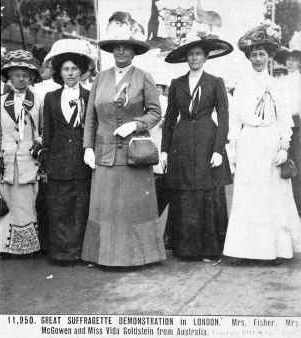

Great suffragette demonstration in London,
Mrs Fisher, Mrs M McGowen & Miss Vida Goldstein from Australia
State Library of Victoria b53755
First there is a short background |
And a couple of examples of their activism But still no success and much opposition |
We start our journey with stories from women fighting for suffrage - the vote.Suffrage: the right of voting in political elections
Suffragist: a person who advocates the extension of the vote esp. to women
Suffragette: a woman seeking the right to vote through organised protest
Oxford DictionaryIn 1788 Australia was pronounced and proclaimed a British colony. The First Australians were not consulted. But a desire for social justice and fairness was expressed in the same year in Britain. It was there that the first public meeting was held to protest slavery and women were active in this movement. In part this led to the Votes for Women (Women's Suffrage) movement.
Also in England, in 1792 Mary Wollstonecraft published Vindication of the Rights of Women. She argued that women had rights as women, not just as mothers daughters and wives.
Suffrage was never 'granted' to women as a gift. Women worked and struggled to win it.
2...IN AUSTRALIAAlice Henry - journalist, unionist and pacifist as well as suffragist, said 'The early Australians brought with them from the mother country the old common law, and built up for themselves in the different colonies a code of law in its provisions closely resembling English statutory law. In anything concerning women there was no suggestion of change, let alone progress.' Marching Towards Citizenship in the Centenary Gift Book ed Frances Fraser and Nettie Palmer, pub The Women's Centenary Council Robertson & Mullens Ltd Melbourne 1934
Norma Grieve: 'Marriage and the family were social institutions that embodied the inferior status of women, on the colonial frontier as elsewhere. The unequal power structure of the family ... placed women continually at a disadvantage., however forceful their personalities might be, and oppressed them grievously where male physical abuse, improvidence or drunkedness led to marital violence or breakdown.' Norma Grieve and Alisa Burns ed. Australian Women New Feminist Perspectives Oxford University Press 1986
Yet change was in the air for some women. In her book Bad Faith, Carmen Callil said that Australia was to develop as a divided nation ... Anglo-Australians, devoted to King, Queen and Country, and others she classified as workers, republicans, dreamers of different freedoms for their new world. Overarching this division were, and are,' she said, 'the original inhabitants.' Carmen Callil Bad Faith A Story of Family and Fatherland Vintage 2007
3...'DREAMERS OF DIFFERENT FREEDOMS'
The gold rush and the French and American revolutions had opened up the possibility of an egalitarian society - the possibility of change. Ideas of human rights were in the air. Ideas of compassion and social and economic justice were beginning to challenge the established order with its stress on law and order, hierarchy and charity for the 'deserving' poor.Clare Wright: 'Commenting on her time in the mid-1850's, Elizabeth Ramsay-Laye remarked on the "equality of consideration for all classes, and by consequence a political and social inclusiveness ... One young woman expressed her delight more concisely. Going to the goldfields, she said, was like "parting with my sex for a season" ... a letter to the editor of the Ballarat Times in 1856 provides compelling evidence that there were women on the diggings who interpreted the ethos of political and social inclusiveness as an invitation to participate more fully in the decision-making processes that governed their lives.' p 212 Victorian Historical Journal, Women's Suffrage Centenary Issue Volume 79 No 2 Nov. 2008
Clare Wright: '... But the dynamic yet still disenfranchised proto-feminist women's rights movement of the 1850's was unceremoniously dropped from public view and the historical narrative. When the contest resumed in earnest some 30 years later, it lacked the historical legacy and cultural authority that an association with gold-rush tenacity might well have lent the suffrage cause.' p 220 Victorian Historical Journal, Women's Suffrage Centenary Issue Volume 79 No 2 Nov. 2008
In Woman Movement in Australia, Vida Goldstein described the beginning of the franchise movement in Victoria -
'The first record of Australian womanhood in Australia was when Mrs Dugdale of Melbourne began writing to the press (Argus) in favour of the enfranchisement of women.' Royal historical Society of Victoria 45(c)
Alice Henry: 'In 1869 the name of Harriet Dugdale was signed to a letter (to the Argus) arguing that women should have full rights of citizenship conferred upon them ... She never missed an opportunity of advocating publicly and privately women's moral right to the franchise, her admission to university honours, to the practice of the professions, and power over her own property.'
Muriel Heagney: 'Soon afterwards Mrs Henrietta Dugdale and Mrs Annie Lowe "had commenced an agitation with which they were associated, to the turn of the century'. Marching Towards Citizenship in the Centenary Gift Book ed Frances Fraser and Nettie Palmer, pub The Women's Centenary Council Robertson & Mullens Ltd Melbourne 1934
'Rights rather than charity' was the principal motivation for some women.The economy was booming but the suffering caused by the attitude of 'profits first, with charity as a back-up' was evident to many, and they believed they could address inequality more effectively if women had full citizenship.
Vida Goldstein: 'Women have never argued that women' suffrage would reform the world. They claim that the ballot is a powerful weapon with which to combat social and industrial wrongs.' The Woman Voter
Many women were concerned that the system where men and women were limited to given roles with only a sprinkling of rights for women was unfair.
5...WOMEN HAD VOTED AND ORGANISED BEFORE
A few women who owned property had qualified to vote in the upper house in Victoria, once, in 1864.
Barbara Kerr: 'The (Victorian) Electoral Act enfranchised all ratepayers on municipal rolls for Legislative Assembly elections in 1863. This had the effect of allowing a small minority of women, who had been permitted to vote in council elections, to vote for the Legislative Assembly, which they did in late 1864. The Electoral Act was hastily reworded to ensure only male ratepayers were enfranchised in 1865.' http://www.vec.vic.gov.au/files/HistoryoftheFranchiseinVictoria.doc
This didn't prevent women from organising.
Yvonne Smith: 'The Young Women's Christian Association was formed in 1871 in Geelong. It was (and is) a Christian organisation formed to provide opportunities for women to to develop their full potential, show concern for the community in responsible action and strive to achieve Peace, Justice and Freedom for all people.' p 9 Taking Time A women's Historical Data Kit compiled and edited by Yvonne Smith, Union of Australian Women
In 1880 women in Melbourne came together to form the first 'Trades Union of Female Operatives'.
Jean Daley: ' ... a little group of women in tailoring ... stood on the steps of Parliament House in 1880, and wondered how long it would be before they suffered loss of employment when it was found out that they would, through a union, endeavour to bargain for better conditions, if necessary strike for them. Mrs Robertson, Mrs Moody, Misses Wise, Pascoe, Stewart and Goodwin were the most active members.' The Trade Union Woman Centenary Gift Book ed Frances Fraser, Nettie Palmer
In 1884 they formed the Victorian Lady Teachers' Association with Clara Weekes at times Secretary and at times President -
Clara Weekes: 'When suffrage is granted to women the claims of the female teachers will receive greater consideration' Annual Report from the Victorian Lady Teachers' Association from p 43 Getting Equal Marilyn Lake Allen & Unwin 1999
6...EQUALITY, AUTONOMY AND SOCIAL JUSTICE
Victoria and Queensland were the first English colonies to demand suffrage but apart from the above short-lived anomaly, Victoria was the last state where women had no vote in State elections. Now they were determined to gain suffrage in Victoria, permanently, and for all women. They saw the vote as vital for their goals of equality, autonomy and social justice. On the 22nd June 1884, women formed the Victorian Women's Suffrage Society - considered the start of the organised suffrage movement in Victoria.
Henrietta Dugdale: 'The men of Victoria are certainly going to lead the way, by setting Conservative Old England the example by granting justice to woman, so idiotically denied to her by the wooden heads of the past!' p.137 Audrey Oldfield Woman Suffrage in Australia Cambridge University Press 1992
The first leaflet issued by the Victorian Women's Suffrage Society
http://www.abc.net.au/ola/citizen/women/women-home-vote.htm7...ALL WOMEN - WOMANKIND - 'WOMAN
In saying 'justice to woman' rather then 'justice to women', Henrietta is expressing something the suffragists believed. By using the word woman rather than women they showed their confidence that they were acting for all women, for womankind - WOMAN - if not humanity! Social justice and human rights arguments were particularly strong in Victoria.
Diane Kirby, in Alice Henry: The Power of Pen and Voice said: 'In Australia progressive reform and the woman movement were inextricably entwined. Nowhere was this better illustrated than in the work of Alice Henry. Alice was living in New York at that time. It was her view that "the woman movement and the labour movement must advance in combination." p 81 Alice Henry - The Power of Pen and Voice Diane Kirby Cambridge University Press 1991
A Lister BA: 'The fact that existing laws are unjust to women, proves that women as a class need the vote to protect themselves and their children.' Why Women Want the Suffrage pamphlet - Royal Historical Society of Victoria
Vida Goldstein: 'It may matter very little personally to any individual woman, whether she has the vote or not. It is of vital importance to the interests of women as a class, that they should have representative government.' Royal historical Society of Victoria 45(c)
In 1888 Brettena Smyth founded the Australian Women's Suffrage Society with men and women members. Suffrage societies in Melbourne came together with other organisations in 1894, forming the United Council for Woman Suffrage. The Victorian Woman's Suffrage League, which was Christian and saw itself as more 'moderate' than other groups in Melbourne at that time, also started that year.
On a lighter note -
Alice Henry, journalist: 'It seems to me that Father has been getting a great many new privileges during the last hundred years or so, and Mother has been left out in the cold. We must see about this. It is not that Father is so very well off; he works in dark, wet mines, and in factories where you can't hear yourself shout for the noise, and his wages aren't ever too big. And he is often out of work, because he has been so busy and made so many shoes or clothes or chairs that the rich people don't need to buy any more and the poor people have no money to buy any.
But he is trying to make things better for himself; he has a great many trade unions, and he often makes enough noise so the legislators have to sit up and listen. Better than all, he has the vote, so than on election day he can help to elect or to defeat those men who want to be legislators. More and more his vote will become worthwhile by all the working fathers working together.
But how is it with Mother? She has just as hard times as father, and she is paid very much less for it. She sees that her girls are out of work more often than her boys; for many girls can only get work a few months out of every year. They have the poorest sort of work, and wretched pay, and many people think it is alright, because they are "only girls". Besides Mother wants all her children to have good things to eat, and nice, pretty clothes, and to live in a house that is a house, where the children can have fresh air and good times, and we want Mother to have good times, too. Nothing will help her get all these things so well as the vote.
The right to cast a bit of paper in a ballot box seems a little thing, but it isn't. Father thinks it is very important indeed. If it is important to him, it is every bit as important for her, and she and all the other working mothers will get together and use it. And, Father will be glad, too, for Mother's home is his home, and it will mean that Father, Mother and children will all have better homes; and factories will be safer, and we will all wonder why we never thought of it before.
If the world is ever to be a better place, you must see to it that Mother is able to catch up with Father. So give Mother the Vote!' Undated Press clipping Royal historical Society of Victoria 45(c)
Another leaflet from that time said:
And:Q. What is women's suffrage?
A. The proposal to give all women of mature age an equal voice in electing our parliamentary representatives.Q. Why do they desire it?
A. That they may assist in making laws for the regulation of their own lives, and for controlling their relation to others, particularly such laws as affect their sex, laws relating to matrimony, the control of children, the protection of girls, and others.Q. But would not their influence tend to weaken good government?
A. How could increasing the number interested in maintaining good government tend to weaken it?
Australian Women Explain: "Why We Want the Vote"
BACK TO TOP"We Women of Victoria appeal to you, the men, the electors in the Colony,
to secure for us the right that you have won for yourselves - THE RIGHT TO VOTE.DEMOCRATS !
Remember that Democracy means Government by the People, and not Government by Half the People.
We want the Vote for the Same Reasons that You want it !
1. WE ARE TAXED - Taxation without representation is tyranny.
2. WE HAVE TO OBEY THE LAWS - Therefore we should have a voice in making them.
DEMOCRATS !
Pledge your member to Secure for the Women of Victoria the same Political Right as is Possessed by the Women of South Australia and West Australia.They didn't just write leaflets. Here are just two reported suffrage actions in the 1890's - the "Monster Petition", and a "Parliamentary delegation".
10..HUMAN JUSTICE, EQUALITY, AND SOCIAL REFORM
One remarkable thing suffragists did was to draw up a petition in 1891 for women's suffrage. Women went around in Victoria from house to house signatures. Marie Kirk, as Women's Christian Temperance Society (WCTU) secretary, presented the 'Monster' petition to the Victorian Parliament.
WCTU: 'May they hope that in this enlightened age the last-born nation of the world may have embodied in its Constitution universal suffrage without regard to sex'. p 50 Audrey Goldfield Australian Women and the Vote pub Cambridge 1994
Isabel McCorkindale ed Pioneer Pathways Sixty Years of Citizenship 1887-1947 Morris and Walker 1948
Mrs M E Kirk, Hon. General Secretary of Victorian WCTU 1888-1913 bottom right11..THE WOMEN'S SUFFRAGE 'MONSTER' PETITION
'That Government of the People by the People, and for the People should mean all the People, and not one-half ______
That taxation and Representation should go together without regard for the sex of the taxed ______
That all Adult Persons should have a voice in Making the Laws which they are require to obey ______
That, in short, Women should Vote on Equal Terms with men ______ .'
http://www.parliament.vic.gov.au/Women's Petition/background.htmVida Goldstein: 'Thirty-three thousand signatures to the Suffrage petition were obtained in less than six months. It was the largest petition that had ever been presented to Parliament on any question and tremendous interest was aroused when the bulky document was carried by several attendants into the legislative chamber.' Royal historical Society of Victoria 45(c)
Vida Goldstein: ''The few women who refused to sign the Petition were, almost without exception, those whose interests ended at the garden gate. Very rarely were refusals made by the wives of working men and by women who took part in social reform work outside the house. These women came face to face with the adverse conditions of human existence, with social, industrial, and moral problems, and saw the urgent need for women taking part in public affairs.
The result of the canvass was that wherever the workers went, in city or country, they found the great majority of women in favour of the vote, and of being on a footing of equality with men in every respect. A striking feature of the canvass was this feeling of equality between men and women was vital in the industrial suburbs. Never once were the canvassers met by a working man who said, "I won't allow my wife to sign the Petition". Vida Goldstein 'The Struggle for Woman Suffrage - summary of the Suffrage Movement in Victoria' presented to the WCTU Melbourne 1947 in Isabel McCorkindale ed Pioneer Pathways Sixty Years of Citizenship 1887-1947 Morris and Walker 1948
This photograph of the rolled up petition (it is 26 metres long unrolled) is taken from the Public Record Office website.
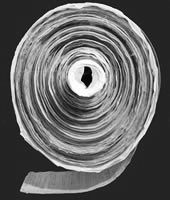
Women's 1891 Petition - Photo: Laura Daniele Public Records Office
12..A PARLIAMENTARY DELEGATION
Joan Curlewis: 'Two hundred women and fifty women lobby Parliament! A mind hitting headline - The year was 1898, the place the Committee Room, Parliament House, Melbourne. These maxi-skirted women were not demanding abortion law reform, or equal pay, or child care centres. They were after the vote.
Victoria's Lower House - the Legislative Assembly - had passed a Women's Suffrage Bill three times. Twice the Upper House - the Legislative Council - had rejected it. Now it was to come before the Council for the third time ... According to the Melbourne Argus, the 1898 deputation was conducted with dignity and decorum, the only interjections being Cheers, Hear-Hear, and Laughter. But the independent labour paper Tocsin told a different story:
Tocsin: 'The weighty, business-like, and earnest speeches of good women voicing the aspirations and heart-wishes of hundreds of thousands were interrupted by low jests and idiotic exclamations.
- Mrs Lowe, one of the many battlers for women's rights history has forgotten, opened the case for the women.
"There are thousands of women in Victoria who at this latter end of the nineteenth century do not wish to remain political babies," she said, "but every woman who loves home and good government, who loves her country and good morals, wants a voice in electing parliamentary representatives in the country where she resides."- Mrs Kelly: "The ballot is said to be a weapon against tyranny," she orated. "If that is so, who is more entitled to have it within reach than women?"
- Mrs Fryer, a Quaker, certainly didn't swallow the myth of male superiority. "As a home is not perfect without a woman to rule it," she declared, "so neither is the State" ... the indignant ladies failed to move the gentlemen of the Council, who gave their verdict by throwing out the Bill yet again. They were to throw it out another thirteen times before finally passing it in 1908, making Victoria the last State in the Commonwealth to give women the vote.' State Library of Victoria Ms 11379 Box 1719/
The Australasian 17 September 1898: 'Vanguard of the deputation that waited on the members of the Legislative Council last week, advancing from Headquarters in Russell Street'
13..BUT STILL NO VOTE FOR WOMEN
Joan Curlewis: '(The) suffrage movement was more active than in other states, embracing such organisations as the Women's Christian Temperance Union and the Methodist Church, no doubt motivated by the same idea (temperance), and the Trades Hall Council (which was) inspired by the socialistic ideal of the rights of women.' State Library of Victoria Joan Curlewis papers
1/9/1900 'Argus " MASS MEETING Flinders Park. Under auspices of Trades Hall Council, 40,000 people were present. All classes of people were there. Trains from Hawthorn-Camberwell could not carry all going to town. Meeting orderly.
Alice Henry: 'In the year 1900, with Federation in sight, the situation had considerably improved ... The Federal Constitution conferred the vote in the referendum on all citizens who already possessed the vote in their own State, and also made the qualification for the vote the same as existed already with the broadest qualification. The women of two States, South Australia and Western Australia, therefore voted in the first Federal elections. To make assurances doubly sure, the Commonwealth Interpretation Act contained the decisive Clause 23: "Words importing the masculine gender shall include females, unless the contrary intention appears." Centenary Gift Book ed. Frances Fraser, Nettie Palmer
The Women's Progressive League was formed to 'secure for women civil and political rights equal to those of men; the general emancipation and advancement of women; the right for women to enter architectural courses and proposed State Agricultural Colleges. General reforms included prison and factory legislation and the establishment of Children's Courts ... The Victorian National Council of Women was formed 22 November 1901 and the Women's Federation in 1902.' p 14 Taking Time A women's Historical Data Kit compiled and edited by Yvonne Smith, Union of Australian Women
Muriel Heaney papers 15 September 1902 -: 'MONSTER MEETING Melbourne Town Hall.' State Library of Victoria
14..1902 THE COMMONWEALTH FRANCHISE
Audrey Oldfield: 'By 1901, when the first Commonwealth election was held, South Australian and Western Australian women went to the ballot box. The women in the other four Colonies were angry that they could not vote for the new Parliament. Once again they held protest meetings, wrote letters and sent out circulars, gathered signatures for petitions, and haunted election meetings.
When the new Parliament met, it had a majority of members who had been persuaded that all Australian women should have the Commonwealth vote, whether they had a State vote or not. A Bill was passed in 1902. The Bill, however, had a special clause in it; it excluded Aboriginal men and women in Western Australia and Queensland from the franchise, because those States did not allow Aborigines the State vote. This injustice was not righted until the 1960's.' p 51 Audrey Goldfield Australian Women and the Vote pub Cambridge 1994
Vida Goldstein: 'The world moves slowly, my masters! woman's world especially; but it does move, and that's something to be thankful for. It took a big step forward on April 24th, 1902, when the first Australian Parliament enfranchised the women of this great continent; it took another on December 16th, 1903, when, for the first time in the world's history, the women of a nation took part in the making of a National Parliament.' pp 47-50 Review of Reviews, Australasian edition, January 1904
Isabel McOrkindale ed: 'At the WCTU Convention, 'Mrs Hobbs, Superintendent of the Suffrage Department, had the joy of reporting that the women of Victoria would vote for the first time under the Federal franchise, to elect representatives to a Commonwealth Parliament. She said: "The WCTU is by far the largest society of women in Victoria, we must exert a great influence. Let us see that we use our votes wisely and well." p 34 Pioneer Pathways Sixty Years of Citizenship 1887-1947, Morris & Walker 1948
Alice Henry: 'In 1903, now that women possessed the Federal vote, Miss Goldstein formed the Women's Federal Political Association, for education of the new citizens in democracy, in both Federal and State affairs ... In 1905, the Association, tired of the long and purposed delay in winning the State vote, assumed control of the State suffrage movement, under the title of the Women's Political Association.' Marching Towards Citizenship in the Centenary Gift Book ed Frances Fraser and Nettie Palmer, pub The Women's Centenary Council Robertson & Mullens Ltd Melbourne 1934
'Why Women Need the Vote' flier for Rose Scott speaking in MelbourneSuffragists were active but so were the anti-suffragists. Vida Goldstein said that some of the arguments against suffrage were:
'Woman's sphere is in the home';
'The hand that rocks the cradle rules the world';
'Women do not want the vote';
'Man is the sturdy oak, woman the clinging vine';
'Women's brains weren't as big as men's';
'There never has been a woman Shakespeare';
'No great country has enfranchised its women, only a few wild-cat American States have done so';
'It was Eve who tempted Adam';
'The bible says women must submit to their husbands".'A more inelegant objection was that "women were shrieking cockatoos". This objection was made by a member of the Legislative Assembly, who, later, became its Speaker, but when Mrs Love, one of the very early pioneers, pointed out in the Melbourne Town Hall that it was the male cockatoos who did the shrieking, we didn't hear any more of that so-called "augument". Vida Goldstein 'The Struggle for Woman Suffrage - summary of the Suffrage Movement in Victoria' presented to the WCTU Melbourne 1947 in Isabel McCorkindale ed Pioneer Pathways Sixty Years of Citizenship 1887-1947 Morris and Walker 1948
16..A FEW CONSERVATIVE MEN ...
Vida Goldstein: 'There never was any opposition from the men in Victoria, as a whole, to women having political equality with themselves. The opposition came from only a few conservative men, from a section of the Press, and, for a brief period, from a few sheltered women, who, immediately after the women were enfranchised for the Commonwealth in 1902 were induced by those same conservative gentlemen to form a political organisation to work in the interests of the conservative party.
At first these women had only male speakers at their meetings for they still considered it "unwomanly" for women to speak in public. But gradually they got over that, and cheerfully took on the hitherto masculine prerogative of political oratory.' Vida Goldstein 'The Struggle for Woman Suffrage - summary of the Suffrage Movement in Victoria' presented to the WCTU Melbourne 1947 in Isabel McCorkindale ed Pioneer Pathways Sixty Years of Citizenship 1887-1947 Morris and Walker 1948
17..THE 1900 ANTI-SUFFRAGE PETITION
Like the 'Monster' pro-suffrage petition, this anti-suffrage petition is merely the largest one. The Australian Women's National League collected 22,798 signatures and submitted them to Parliament 11September 1900:
The petition of the undersigned women, resident in Victoria, humbly sheweth:-
That there is a Bill before your Honourable House to confer the Parliamentary franchise on women. That your petitioners are convinced that this measure will not be for the good of the State for the following reasons:-
It will be the cause of dissension in families.
Many women have neither the time nor opportunity to inform themselves concerning great public questions without neglecting the training of their children and the comfort of their homes.
Suffrage for women will force them from the peacefulness and quiet of their homes into the arena of politics and impose a burden upon them in addition to their present duties.
The present feeling in favour of the measure will pass away, but the effect of the measure will remain.
The women of Victoria as a body have never yet expressed an opinion upon the subject of women's suffrage. We believe that if they had an opportunity of so doing they would be against its adoption. The movement in favour of it has been promoted by a comparatively small minority of the women of Victoria, backed by a political party which hopes to increase its influence thereby.
We pray your Honourable House not to impose this burden upon us, at least until the bulk of the women have expressed an opinion upon the subject.
And your petitioners will ever pray ...' Public Records Office of Victoria
This is a photograph of the first page of the anti-suffrage petition taken from the Public Records Office of Victoria website.
Public Records Office of Victoria 2599-P0000-00194It was no more successful than the pro-suffrage petition. In reference to the 'burden' referred to here, it was not compulsory to vote at that time.
18..VICTORIAN EMPLOYERS ASSOCIATION
Elizabeth Coady: 'In 1903, the same year Vida Goldstein (with many other women) formed the Women's Federal Political Association (WPA), Frederick Derham ... moved once more to forestall the attempts to gain the vote for Victorian women ... Victorian employers moved to "unite in defence of their interests" and the Victorian Employers Federation (VEF) was born in 1902.' 148-149 They are but Women The Road to Female Suffrage in Victoria Melbourne University Press 2008
In March, 1904, the anti-feminist Australian Women's National League (AWNL) was founded by Victorian Employers Federation. Its charter was for Throne and Empire, The Family and to combat socialism.. In Taking Time Yvonne Smith said it 'espoused patriotism and the sanctity of the home ... In September 1905 there were 10,000 members and 83 branches and ... it formed an anti-socialist alliance with the Farmers' League. (See Chapter 4:6)
Elizabeth Coady: 'Derham approached Janet Lady Clarke "... with a request that she gather women who had signed the anti-suffrage petition to discuss the formation of a group that would continue to fight socialism and suffrage for women." ... In the beginning the stated objectives of the Australian Women's National League were to support loyalty to the throne, to combat socialism and to preserve the purity of the home. In 1905 the League acknowledged that there was a need to educate women in politics.' 148-149 They are but Women The Road to Female Suffrage in Victoria Melbourne University Press 2008
In 1907 it held the first Pan-Australian Conference of Anti-Socialistic Women's Organisations (25 October 1907).
At this time there was a further explosion of activity from suffragists.
As a cartoonist saw it 1896 State Library of Victoria mp009771They were a disparate group. Women came together across class, political and religious differences. They came from churches and trade unions, from the abolitionist (abolishing slavery) campaign, temperance and the peace movements, from industry and from the home.
They were evolutionists, pacifists, temperance advocates, equal pay advocates, religious, free thinkers, social reformers, mothers and spinsters, rich and poor, employers and employees. They were young and they were old. They saw each other as partners, associates and friends. They were inspired by ideas of fairness, equality and justice, ethics and morality. They were supported by a large section of the community. For example:
Women's Christian Temperance Union leaflet, 1894: 'Woman's suffrage ... because it is the foundation of all political liberty that those who obey the law, should be able to have a voice in choosing those who make the law.'
A Member of Parliament in a debate in Victoria, Victorian Parliamentary Debates, vol 96, 11/12/1900, p 117: 'Woman's suffrage ... because a Government of the people, by the people, and for the people, should mean all the people not one half.'
Vida Goldstein was probably the best known suffragist in Victoria.
Joan Curlewis: '... she organised tirelessly and tenaciously for a variety of causes - the vote, equality of opportunity, higher wages, old age pensions, anti-conscription and a host of other minor matters.' State Library of Victoria Joan Curlewis papersVida Goldstein: 'Self government in the home and the State should be the inalienable right of every normal adult, so that just as women should not have to owe obedience in the home to a man, nor should she owe obedience to men, as a whole, as prescribed by modern society.' Muriel Heagney notes, State Library of Victoria
Vida GoldsteinMany women were inspired by issues and events that were more specific to social and economic conditions in their society. There were many social problems at the time - economic injustice, poverty, unemployment and sweated labour (particularly amongst women), homelessness, alcoholism and drug addiction, sexually transmitted diseases, violence against women, child abuse including paedophilia, to name a few. They saw the vote as a powerful way to address social issues.
Some examples are -
1. The Women's Christian Temperance Union (WCTU) - 'for God, home and humanity' - was formed in Melbourne in 1887 to educate, agitate and organize to purge society of the evils of alcohol. Yet Janice Brownfoot describes it as morally feminist, demanding -
'laws which will give rights to all its citizens irrespective of sex, laws which will protect the home and make for one standard of morals for both sexes'
Women's suffrage made up much of its work from 1891, when it published the National Franchise Manual.' Janice N Brownfoot Women's Organisations and the Woman Movement in Victoria Hon thesis Melbourne University 1968
Vida Goldstein: 'The Struggle for Woman Suffrage - The names of great Temperance and Suffrage workers in England and America had long been household names among public spirited Victorian women, inspiring our mothers and grandmothers to cherish the ideals of human justice, equality, and social reform, and then to welcome the formation of the WCTU in this "Colony," as it was then.' Isabel McCorkindale ed Pioneer Pathways Sixty Years of Citizenship 1887-1947 Morris and Walker 1948
2. The Victorian Women's Franchise League - formed in 1894 to obtain the Parliamentary franchise for women on the same terms on which it is given to men, was largely made up of women who thought, like Vida Goldstein, that:
'Women have never argued that women' suffrage would reform the world. They claim that the ballot is a powerful weapon with which to combat social and industrial wrongs.'
3. The Victorian Lady Teachers' Association - Marilyn Lake suggested 'They usually saw and were affected by a particular injustice such as working conditions that they felt could be addressed if they had the vote. For example, the Victorian Lady Teachers' Association said 'When suffrage is granted to women the claims of the female teachers will receive greater consideration.' p 43 The History of Australian Feminism Marilyn Lake, Allen & Unwin 1999
Marjorie Theobald: "As a sex we are labouring under many and unreasonable handicaps. Men’s interests are not women’s interests, therefore there is a great need for solidarity amongst women. There are no prizes allowed us in the Education Department, we are excluded from all the higher positions. As there is no valid reason why this inequality and discrimination should continue to exist, women teachers should demand, with one voice, that they be wiped away." Marjorie Theobald, Knowing Women, Cambridge 1996
4. The Queen Victoria Hospital - 'In 1896, a group of firebrands banded together to establish the Queen Victoria Hospital, the first of its kind in Australia, and at the time, one of only three in the world. Its legacy remains at the Queen Victoria Women’s Centre (QVWC), which is celebrating 110 years of the tradition of providing services for women by women. Built by its founders to provide medical services for women, the ‘Queen Vic’ forged a space in the medical world for women. In the days when the only acceptable occupation for a lady was as a governess or teacher, the founding female doctors faced a considerable battle.
Ridiculed by the editor of the Australian Medical Journal who described any professional woman as ‘… beings whom men do not love and with whom women can hardly sympathise …’, he branded medical women as ‘curiosities’ along with ‘… dancing dogs, fat boys and bearded ladies'. http://www.qvwc.org.au/news_and_events/media_and_news_items/celebrating_110_years
5. And more -
Vida Goldstein: 'The traces of our Common Law, which gives a man a right to chastise his wife, are still seen in the utterly inadequate penalties inflicted on men for assaults upon their wives, as contrasted with the severe penalties for assaults on men. No married woman is eligible for the Public service. A man can will away his property, leaving wife and children destitute. A husband has only to go to another colony to be free from the responsibility of maintaining his wife and family. In industry women are frequently placed at a disadvantage owing to the political influence of men who have votes. In cases where separation is obtained by the wife owing to the brutality of the husband the magistrates have no power to order the custody of the children to the mother.Women are at present excluded from various trades and professions, and they require the suffrage in order that they may remove all artificial disabilities which make sex and not merit the test of efficiency. Wherever women and children are in subjection, supervision by women is necessary, and the vote is needed to secure the appointment of women as inspectors of asylums, hospitals, schools, factories and gaols. Police matrons are urgently required in our watch-houses, where young girls and women, often in sickness and dire necessity, are locked up for the night in the sole charge of men.' Vida Goldstein notes, Royal historical Society of Victoria 45(c)
Some other issues suffragists wanted to address were printed in Tocsin in May 1903 -
- Victorian Women's Federation called a meeting of domestic servants at the Melbourne Coffee Palace - May 8 1903. At close of meeting about 50 (most present) handed in their names to join "Victorian Domestic Workers' Union", entrance fee 6d, monthly contribution 6d.
- Deputation waited on Premier re fever hospital requesting hurry opening and arrange for women on the Committee of Management and arrange for an ambulance to take patients to hospital. Dr Mary Stone, Mrs Lowe, Miss Locke and others spoke.
- Women's Progressive Leagues women waited on Chief Secretary six months ago and asked for reforms re inspection and adoption of infants. State Library of Victoria
Victorian women had organised in many ways. They had organised for women to have the vote in the Commonwealth Parliament. Now they were organising women to have the vote in the Victorian Parliament.
In the next chapter, "Who Were the Suffragists?" we look at the some of the work and ideas of ten well known suffragists so we can form an idea of what inspired them.
